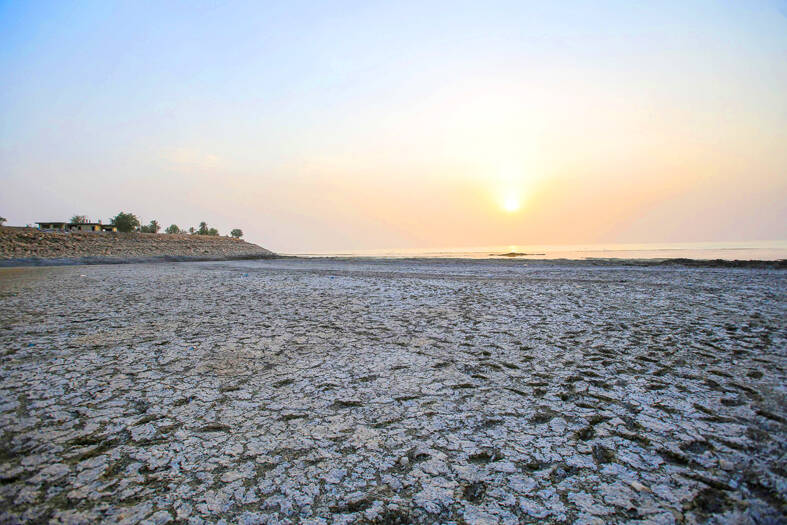Iraqi merchant Mohamed has never seen such a grim tourist season — years of drought have shrunken the majestic Lake Habbaniyah, keeping away the holidaymakers who once flocked there during the summer.
“The last two years, there was some activity, but now there’s no more water,” said 35-year-old Mohamed, asking to be identified by his first name only.
He laid out inflatable water floats, nets and shirts in front of his lakeside shop, but expected few if any customers.

Photo: AFP
“This year, it’s dry, dry,” Mohamed said, his shirt soaked in sweat in the inhospitable heat of nearly 50°C.
Shorelines at Habbaniyah, about 70km west of the capital, Baghdad, have receded by several dozen meters after four consecutive years of drought ravaged parts of the nation.
The UN ranks water-stressed Iraq as one of five nations most impacted by some effects of climate change.
When full, as it last was in 2020, the lake can hold up to 3.3 billion cubic meters of water, said Jamal Odeh Samir, director of water resources in Anbar Province, but now “the lake contains no more than 500 million cubic meters of water.”
Shops like Mohamed’s and holiday homes by the lake now sit empty in the height of summer. On the beach, stray dogs wander between unused umbrellas.
To get to the water, visitors must walk through foul-smelling mud that was once submerged under the lake surface.
The resort was created around the artificial lake in 1979, becoming a popular destination for tourists from across the Middle East in the following years.
Declining rainfall over the past four years and rising temperatures have hit Habbaniyah — alongside much of the rest of the nation — hard.
Baghdad blames upstream dam construction by Turkey on a staggering low water level in the Euphrates River, which feeds the lake and also runs through Syria.
“The strategic water reserves in Iraq are at their lowest point” in nearly a century, said Khaled Shamal, spokesman for the Iraqi Ministry of Water Resources.
Last week during a visit to Baghdad, UN High Commissioner for Human Rights Volker Turk warned that “rising temperatures plus the drought, and the fact that the loss of diversity is a reality, is a wake-up call for Iraq and for the world.”
Sada’a Saleh Mohamed, a local official overseeing finances at the Habbaniyah resort, said that “the lake has receded” and tourism has become “really very weak.”
“The lake has become a pond of stagnant water, unsuitable for consumption or for swimming,” he said.
When evening fell and temperatures dropped slightly, a few people finally arrived to barbecue on the beach.
Qassem Lafta came with his family from the nearby city of Fallujah.
“Before, we would come here and it was much better, the water was higher,” the 45-year-old merchant said.
He said he hoped authorities would revive the lake.
“It’s the only place where people from Anbar, southern Iraq and Baghdad can come to relax,” he said.

MONEY GRAB: People were rushing to collect bills scattered on the ground after the plane transporting money crashed, which an official said hindered rescue efforts A cargo plane carrying money on Friday crashed near Bolivia’s capital, damaging about a dozen vehicles on highway, scattering bills on the ground and leaving at least 15 people dead and others injured, an official said. Bolivian Minister of Defense Marcelo Salinas said the Hercules C-130 plane was transporting newly printed Bolivian currency when it “landed and veered off the runway” at an airport in El Alto, a city adjacent to La Paz, before ending up in a nearby field. Firefighters managed to put out the flames that engulfed the aircraft. Fire chief Pavel Tovar said at least 15 people died, but

South Korea would soon no longer be one of the few countries where Google Maps does not work properly, after its security-conscious government reversed a two-decade stance to approve the export of high-precision map data to overseas servers. The approval was made “on the condition that strict security requirements are met,” the South Korean Ministry of Land, Infrastructure and Transport said. Those conditions include blurring military and other sensitive security-related facilities, as well as restricting longitude and latitude coordinates for South Korean territory on products such as Google Maps and Google Earth, it said. The decision is expected to hurt Naver and Kakao

THE TRAGEDY OF PUNCH: Footage of the seven-month-old Japanese macaque has gone viral online after he was rejected by his mother and formed a bond with a soft toy A baby monkey in Japan has captured hearts around the world after videos of him being bullied by other monkeys and rejected by his mother went viral last week. Punch, a Japanese macaque, was born in July last year at Ichikawa City Zoo. He has drawn international attention after zookeepers gave him a stuffed orangutan toy after he was abandoned by his mother. Without maternal guidance to help him integrate, Punch has turned to the toy for comfort. He has been filmed multiple times being dragged and chased by older Japanese macaques inside the enclosure. Early clips showed him wandering alone with

Australian Prime Minister Anthony Albanese yesterday said he did not take his security for granted, after he was evacuated from his residence for several hours following a bomb threat sent to a Chinese dance group. Albanese was evacuated from his Canberra residence late on Tuesday following the threat, and returned a few hours later after nothing suspicious was found. The bomb scare was among several e-mails threatening Albanese sent to a representative of Shen Yun, a classical Chinese dance troupe banned in China that is due to perform in Australia this month, a spokesperson for the group said in a statement. The e-mail